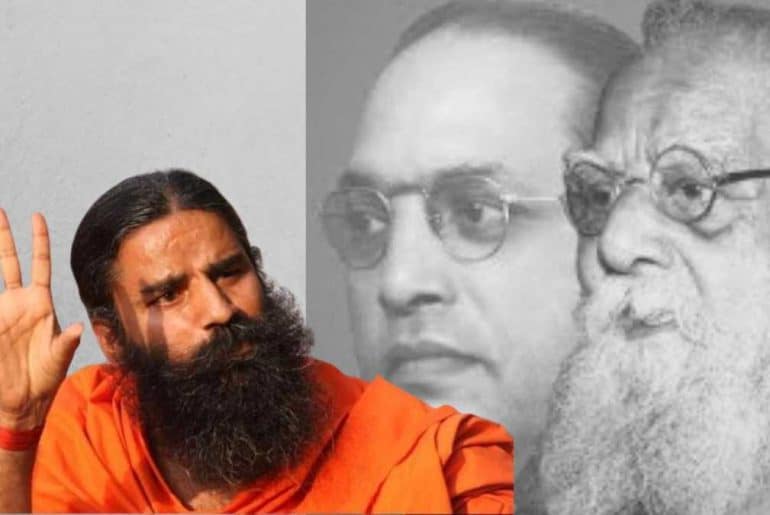Recently, two videos of prominent Hindu religious personalities have gone viral for their casteist purports. When the masses are quick to debunk the existence and gravity of caste in the present age, the videos provide a reality check on the deep-entrenchment of the caste question in the Indian society.
“I am an Agnihotri Brahmin. They said Baba ji, you are OBC. OBC aisi taisi karayein. I have read 4 vedas I am Chaturvedi Brahmin.” After this viral video, Yoga guru and Patanjali founder Baba Ramdev has been under fire for his casteist remarks against the OBC community. A Patanjali Boycott movement also trended following this incident. In a follow up video, a reporter sneakily tried to save his face by asking the question, “You said Owaisi ki aisi ki taisi… OBC ki aisi ki taisi,” to which Ramdev immediately jumped on the opportunity to reply “Owaisi! (Asaduddin Owaisi) He’s not right in the head. He and his ancestors have been anti-national. I did not say anything about OBC people.”
Another video of Shankaracharya Swami Avnimukteshwaranand’s comments on the inauguration of the Ram Mandir has gone viral, where he says “After the purification of the Ram Mandir, if the construction workers (shudras, dalits) enter again, the temple will become polluted (ashuddh).” In a second video, Shankaracharya has reiterated his Brahmin caste repeatedly “Only a Brahmin can be a Sanyasi. If I am not Brahmin, then what is the point? I will quit if my Brahmin Caste is not proven. The Hindu Samaj will bash me for lying.”
What do we infer from these comments of two prominent figures that have significant influence in the Hindu community? Perhaps, that the idea of Hindu unity against other forces that has been steadily gaining popularity is merely a façade. Despite attempts to unite the Hindus in a singular unified fabric by dodging the ‘caste’ bullet in all dialogues, these comments are quick to slip the mask and open our eyes to the reality. That caste is still relevant, perhaps more relevant than ever due to its clever manipulation in the political scenario is a hard pill to swallow by both people from the upper-castes and the oppressed castes who are being denied affirmative action, yet mobilised for their identity.
The need to reiterate your upper caste hierarchal social standing is a reminder that no matter how much dismissal there has been regarding the importance of caste in present times, caste is never going away. It may hide under the guise of positive strides and increased representation in the political sphere, but the oppressive character of the system shows up through the crevices. It takes the form of casual casteist remarks, dropping casteist slurs in conversations, targeting quota students, calling an end to the reservation system, and other forms of institutional casteism. The irony that the craftsmen of the extravagant Temple are being dismissed as ‘pollutants’, then subtly being denied access to their art through the comments of a revered upper-caste custodian of the Hindu religion, speaks volumes. While the unexpected remark directed at Owaisi may appear absurd, it is essential to delve into the implications of Baba Ramdev’s comments. Baba Ramdev, who is known for his extensive ties with right-wing political groups and enjoys substantial support within that sphere, made a concerted effort to distance himself from the OBC label. In doing so, he took a swipe at the community while emphasising his ‘Brahmin’ identity. This sequence of events speaks volumes about the larger meaning which he stands for.
Targeted crimes and discrimination against the oppressed castes is still prevalent and rampant. Despite this, in current times there has been an erasure of the systematic oppression instigated by the caste system. While columnists like Tavleen Singh, an Upper Caste woman, cries for reservation to be scrapped and writes that reservation “Should not be available to those who belong to the OBC (Other Backward Caste) category. They do not need it. Anyone who knows rural India slightly knows that these ‘backward’ castes are not backward at all. In the Hindi heartland, they sit at the top. The Prime Minister himself admits proudly to being OBC,” what she fails to see is that reservation has never been a poverty alleviation programme, it has been about representation and equality of opportunities and must continue as long as subjugation on caste persists. Aditi Narayani Paswan’s article is an apt response to Tavleen and many more such privileged people who continue to minimise the forces of caste in present times, “We must realise how caste is embedded in our lives and how deeply entrenched it is in our consciousness. We must seek answers to why all the ragpickers and sanitation workers invariably belong to one caste and why the judiciary belongs to descendants of a few castes or families before we start to question reservation — the only line of defence for the marginalised sections of our society. It is because of reservation that we find Dalits, STs and OBCs’ names on the houses along Lutyens.”
Or as an extension to Aditi’s idea, how Baba Ramdev and Shankaracharya are both insistent on asserting their Brahminical identity, and let their casteism unveil in the celebration of a united Hindu identity.
Read also: Hamare Ghar mai toh yeh sab Nahi Hota
Featured Image Source: The Quint
Sarah Nautiyal





